Chapter 1 TCM Conception of Nature/ 1
Ⅰ. Unity of the Heaven and Human/ 2
1. Birth of the Heaven and Man/ 2
2. Unity of the Heaven and Human /5
3. Following the Examples of the Heaven and Earth /8
Ⅱ. Yin, Yang and Five Phases/ 10
Chapter 2 TCM View of the Human Body/ 17
Ⅰ. Composition of the Human Body/ 18
1. The Human Body: A Country/ 18
2. Meridians: Covering the Whole Body/ 24
Ⅱ. Correspondence between the Interior and Exterior of theBody/ 25
1. Correspondence among the Five Zang-organs, Six Fu-organs, Five Body
Constituents and Orifices of Sensory Organs/ 26
2. Correspondence between the Tongue and Zang-fu Organs/ 27
3. Correspondence between the Five Zang-organs and Eyes/ 27
4. Correspondence between the Zang-fu Organs and Face /28
5. Correspondence between the Zang-fu Organs and Wrist Pulse /28
Ⅲ. Life Cycle /30
1. The Growing and Aging Cycle /31
2. Cycle of Tiā n Gǔ i (Sex-stimulating Essence) /33
Chapter 3 Medicinals and Foods in TCM/ 37
Ⅰ. Same Origin of Medicinals and Foods /38
1. Medicinals and Foods /38
2. Food, the First Necessity of People/ 43
3. Rules of Dietary Therapy /44
Ⅱ. Commonly Served Medicinal Foods /47
1. Substances Served as Both Food and Medicine/ 47
2. Variety of Medicated Foods /48
Ⅲ. Administration of Medicinals Similar to Deploying Military Force: Monarch, Minister, Assistant and Guiding Medicinals 52
1. Composing Principles of Formulas/ 52
2. Classical Herbal Formulas/ 54
3. Modifications of the Composition in a Formula/ 56
Chapter 4 Outlook of TCM Treatment/ 59
Ⅰ. TCM Diagnosis /61
Ⅱ. Differentiation of Patterns in TCM/ 63
Ⅲ. TCM Therapies /64
1. Medicinal Therapy/ 65
2. Acupuncture and Moxibustion Therapy/ 66
3. Tuī Ná Therapy /67
4. Cupping Therapy /67
5. Guā Shā (Scraping) Therapy/ 68
6. Other Therapies /69
Ⅳ. Prevention of Diseases in TCM /70
1. What Is Prevention before Disease Arising?/ 71
2. View of Health Preservation in TCM/ 72
Chapter 5 TCM and Folk Customs /83
Ⅰ. Chinese New Year's Eve/ 84
Ⅱ. Lantern Festival /87
Ⅲ. Tomb Sweeping Day/ 89
Ⅳ. Dragon Boat Festival /90
Ⅴ. Mid-autumn Festival/ 93
Ⅵ. Double Ninth Festival /95
Ⅶ. Winter Solstice /97
Ⅷ. Là Bā /99
Chapter 6 TCM and Confucianism/ 103
Ⅰ. Outlook on Life by Confucius and Mencius /104
1. Confucius: Human-oriented, Benevolent and Loving /104
2. Mencius: Maintaining Whole-hearted Devotion, Nature of Kindness,and Awe-inspiring Righteousness/ 107
Ⅱ. Confucian Scholar-physicians/111
1. Zhang Zhongjing: Treating Patients in Courtroom/ 112
2. Zhang Congzheng: Confucians' Duties to Their Parents /113
3. Zhu Danxi: Confucian Scholar-physician /114
Ⅲ. Viewpoints of Confucian Scholar-physicians/ 116
1. Medicine as Benevolent Art/ 116
2. Benevolent Art Represented by Medicine, Filial Piety by Learning Medicine /118
3. Good Physician Second Best to Good Prime Minister/ 119
4. Longevity for Kind People and Happiness for Intelligent People/ 121
Chapter 7 TCM and Taoism/ 125
Ⅰ. Lao Zi and Zhuang Zi's Ways of Health Preservation /126
1. Lao Zi' s Way of Health Preservation/ 127
2. Zhuang Zi' s Way to Stay Healthy/ 128
Ⅱ. Taoist Physicians/ 131
1. Ge Hong: Junior Immortal on the Earth /131
2. Tao Hongjing: Prime Minister in Mountains/ 134
3. Sun Simiao: Supreme Chief of Medicine /136
4. Liu Wansu: Noble Master/ 139
5. Fu Shan: Man with Lofty Ideals /141
Ⅲ. Taoist Viewpoints on Medicine/ 143
1. Medicine and Taoism Sharing the Same Origin /144
2. Three Treasures of the Human Body/ 145
3. Abstinence from Grains /148
4. Returning to Origin /150
5. Combination of the Dynamic and Static States /151
Chapter 8 TCM and Buddhism/ 155
Ⅰ. Origin of Buddhist Medicine /156
Scriptures 161 Ⅱ. Leading Figures of Buddhist Medicine /163
1. Thousand Years of Medical Heritage Preserved by Shaolin Chan-sect Medicine/ 163
2. Introduction of TCM to Japan by Monk Jian Zhen/ 167
3. Yu Chang: Famous Buddhist-physician/ 169
Ⅲ. Viewpoints of Buddhist Medicine /171
1. Four Elements and Five Aggregates/ 171
2. Cause-and-Effect View of Disease /172
3. Psychologic Treatment 174
4. Vegetarian Regimen 176
Author's Note 179
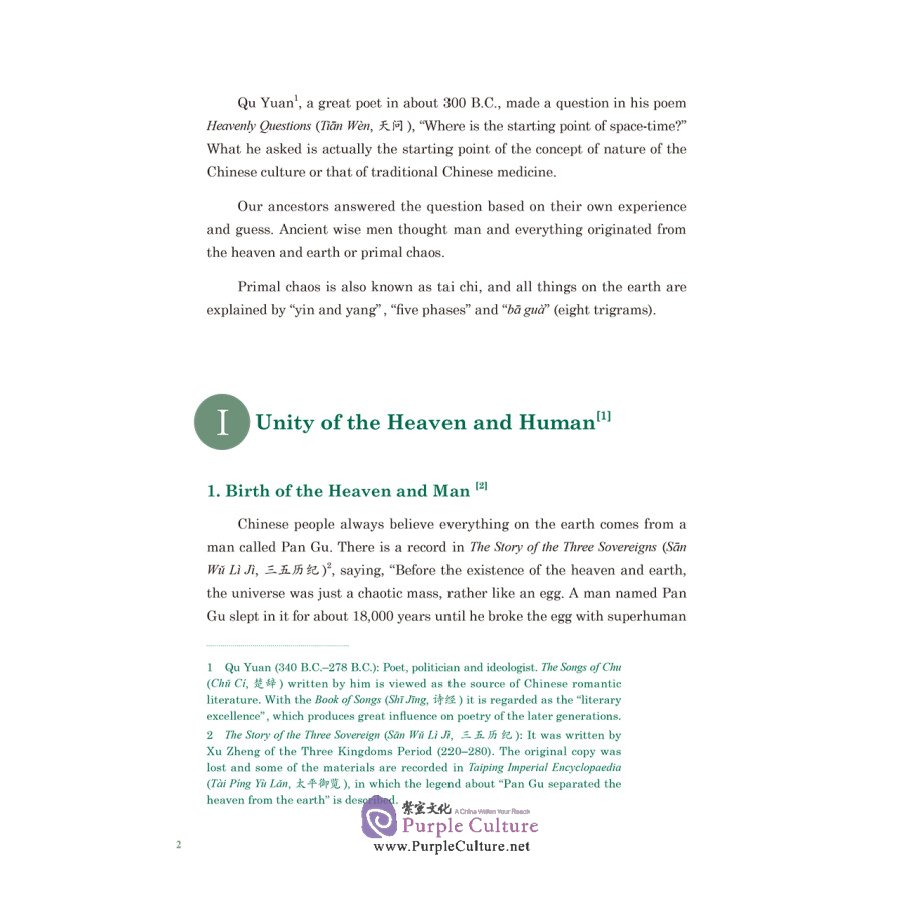
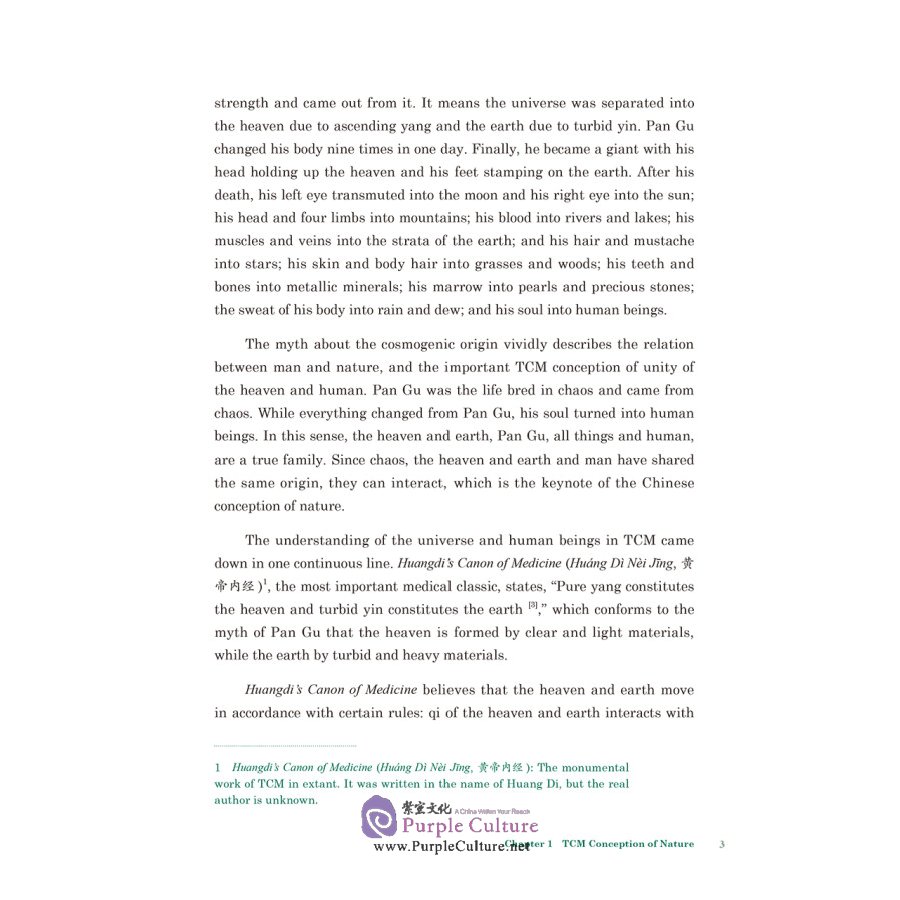
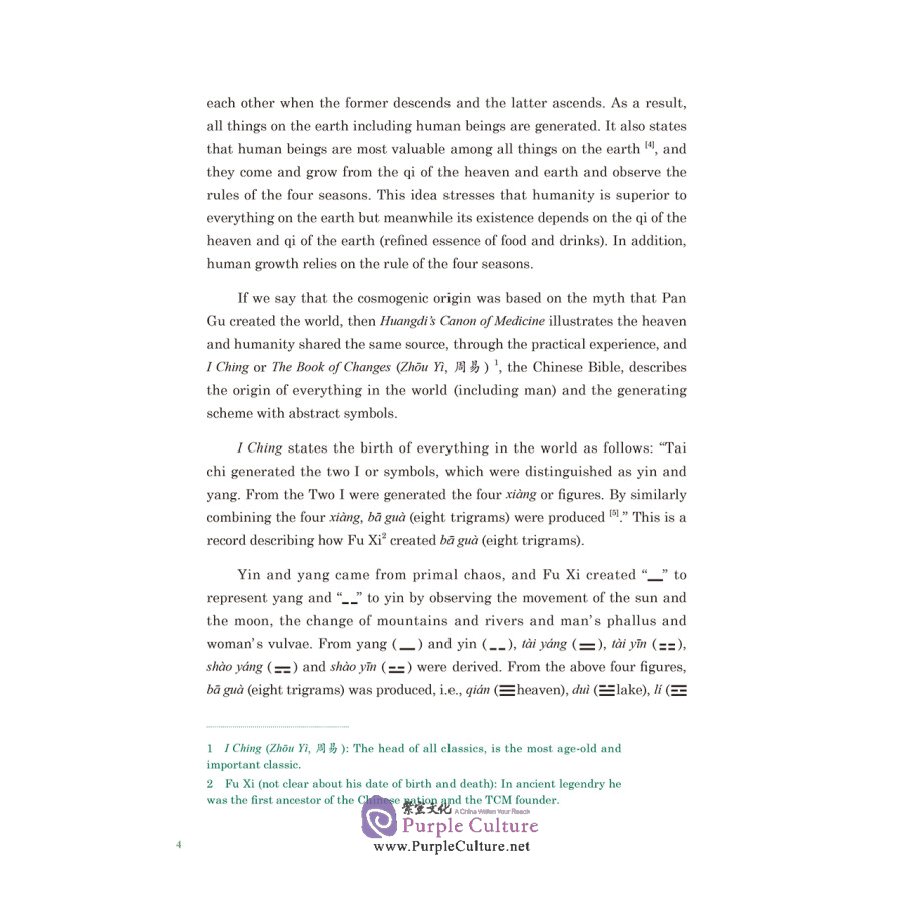
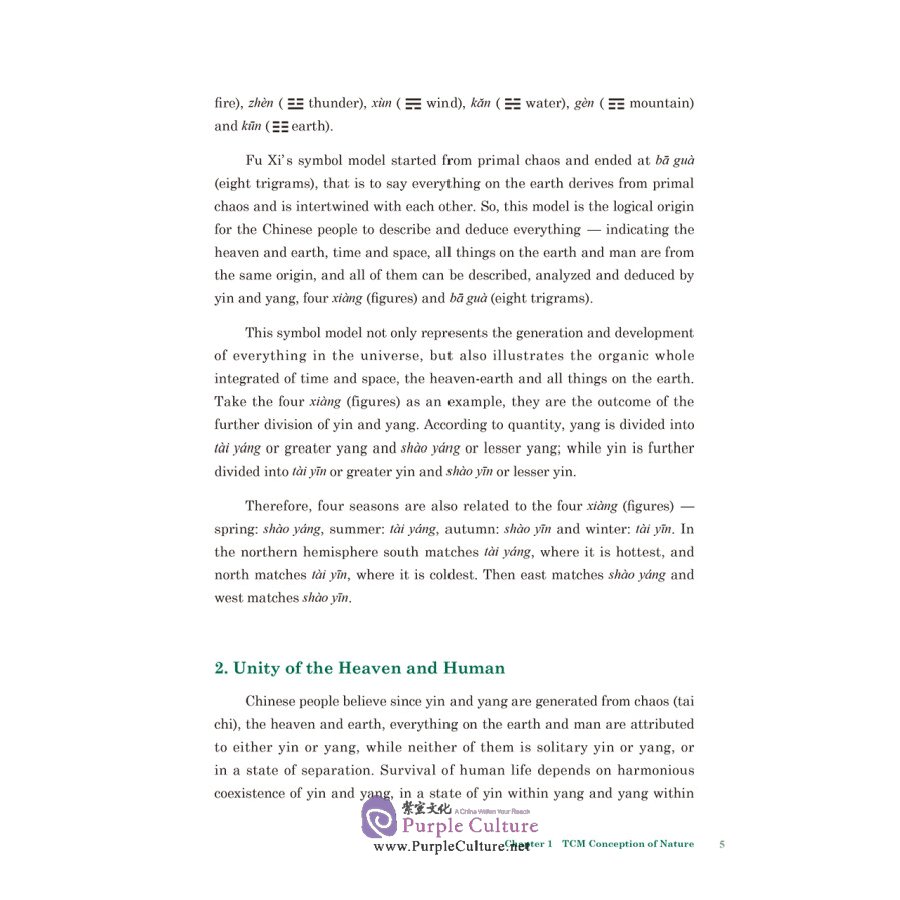
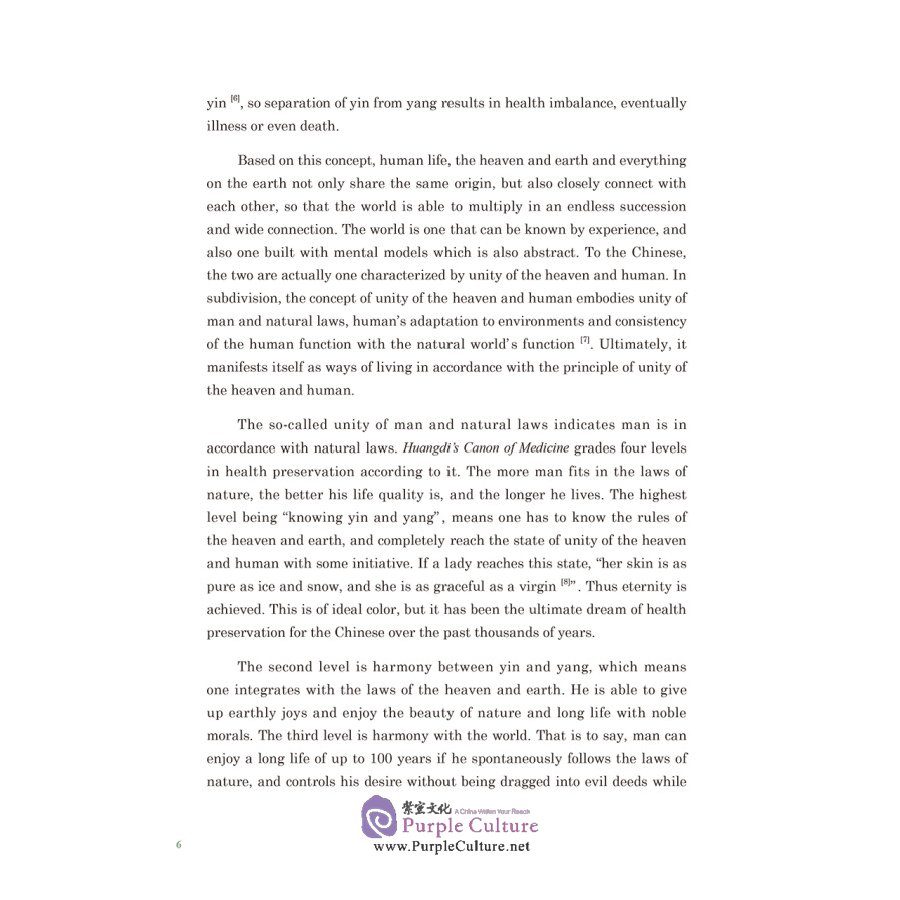
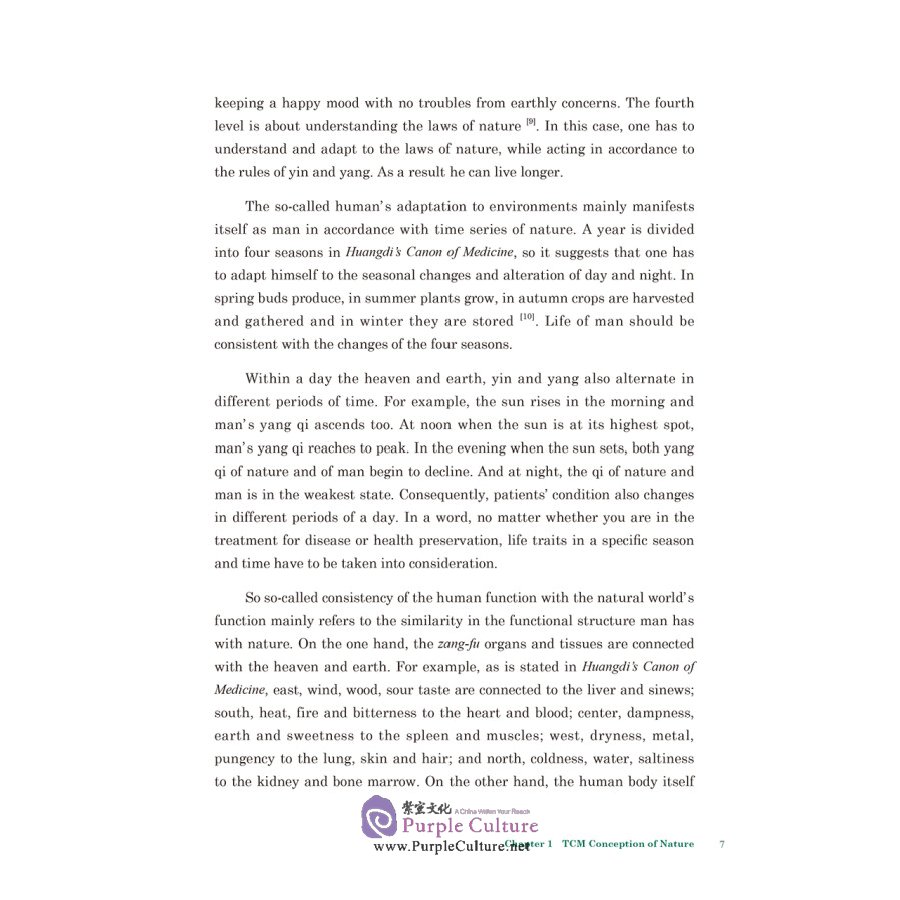
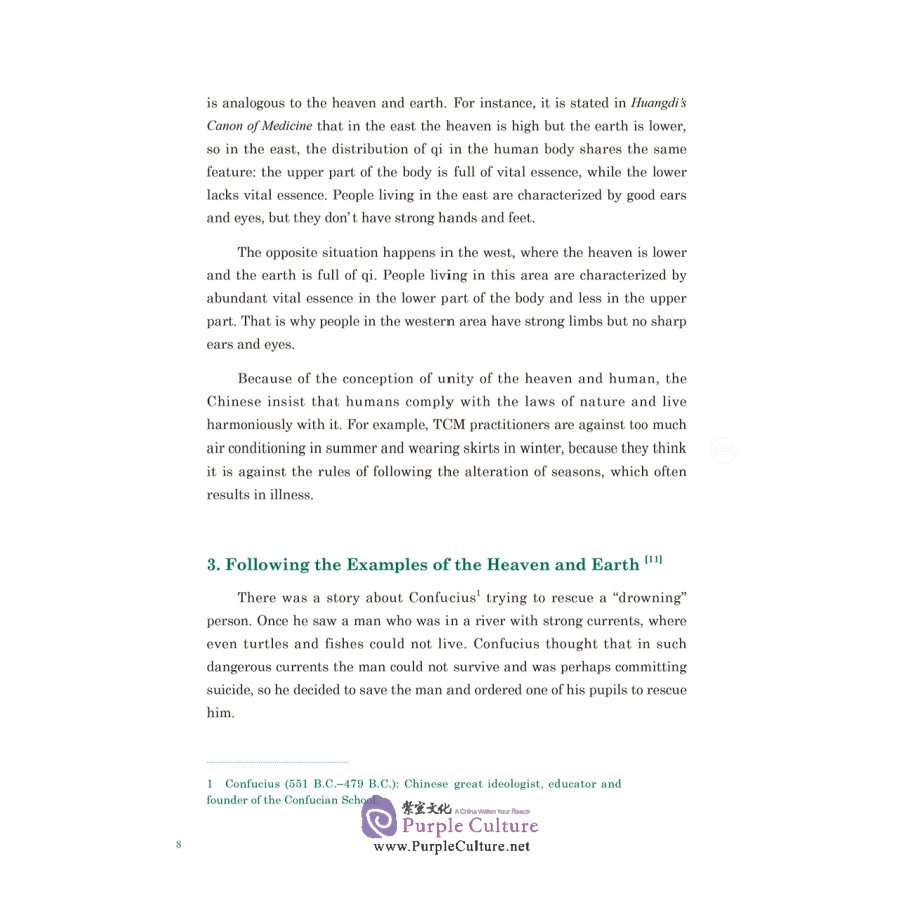
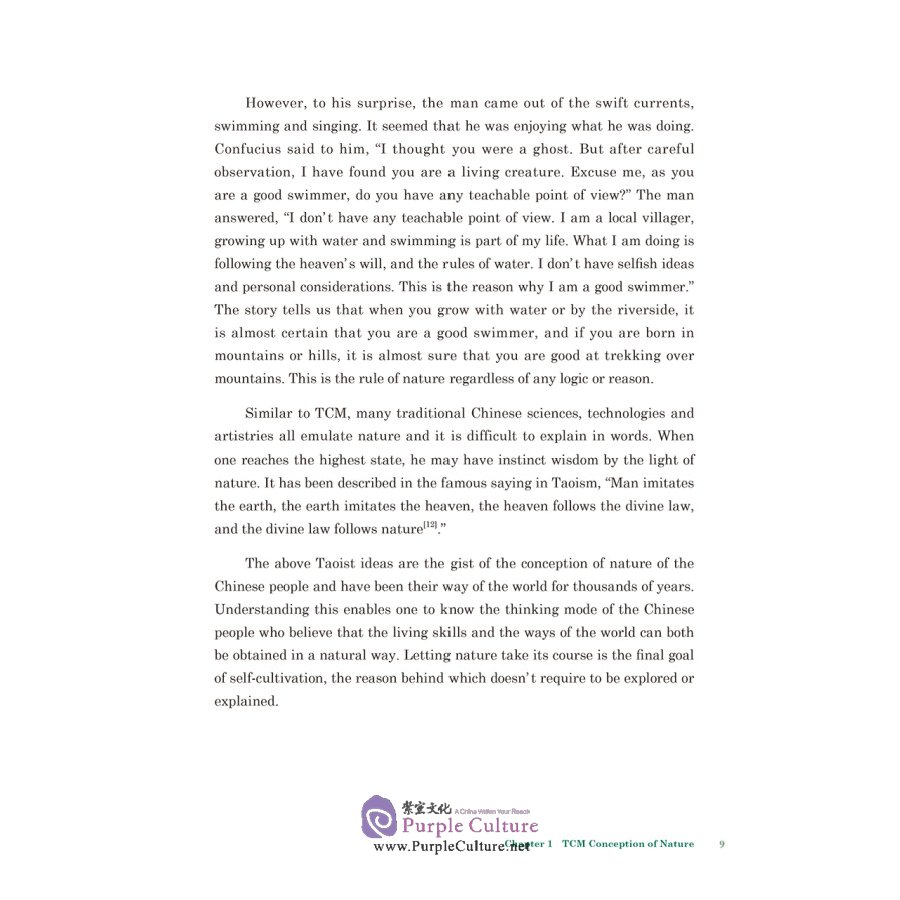
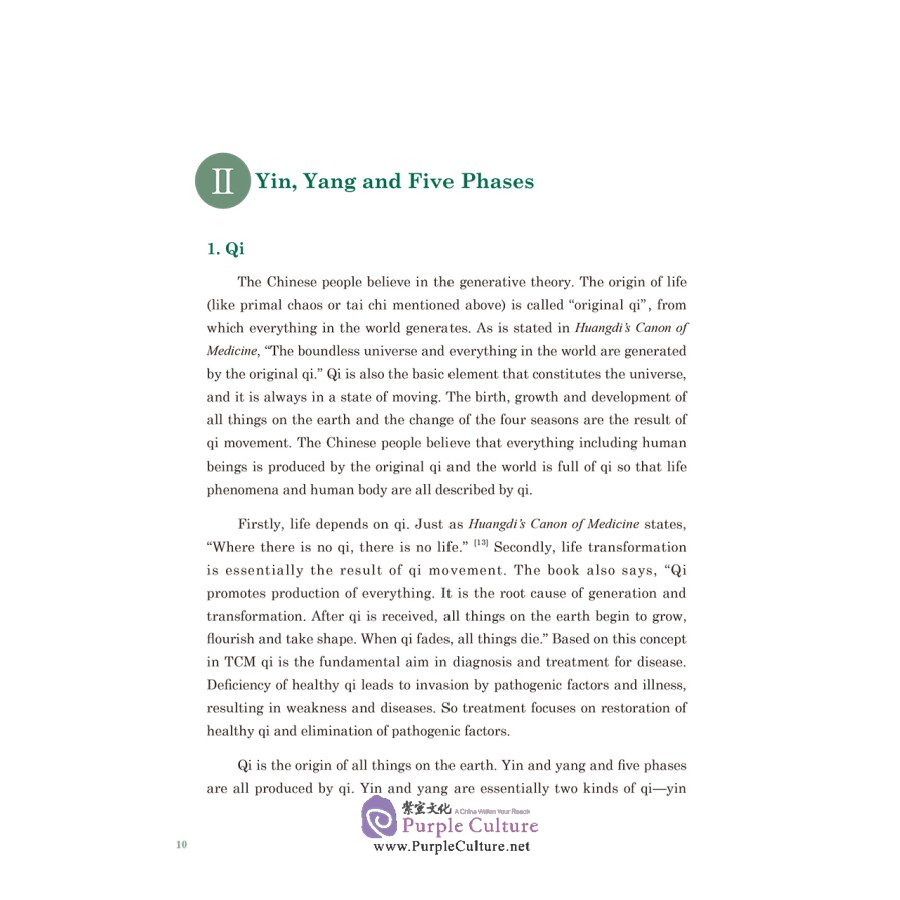
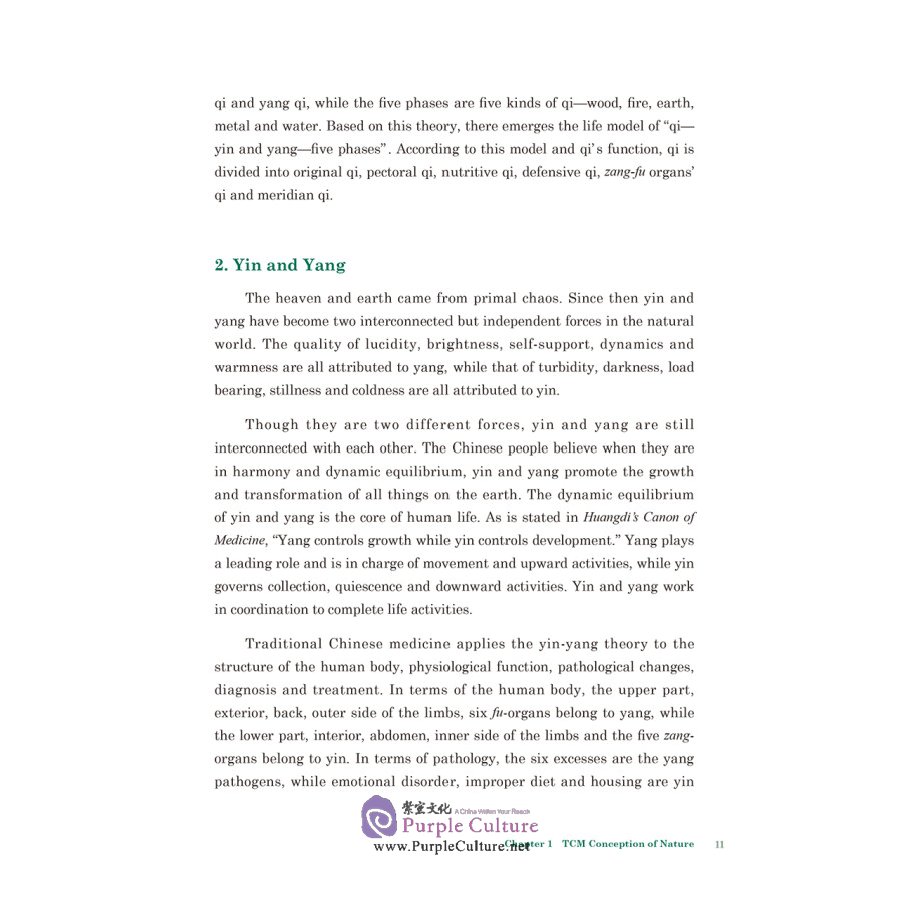
In ancient China, there was a myth of the cosmogenic originwhich vividly described the relation between man and nature.According to the myth, Pan Gu separated the sky from the earth.At the beginning, the universe was just a chaotic mass, ratherlike a big egg. A man named Pan Gu broke the egg with hissuperhuman strength. After that, his body turned into everythingin the universe, even human beings came from his soul after hisdeath. The legend figuratively illustrates a very important conceptin traditional Chinese medicine (TCM) — "unity of the heaven andhuman" .
Traditional Chinese medicine is a branch of science originatedin ancient China, which studies human life, health and illness. In anarrow sense, TCM, also known as Han medicine, is the traditionalmedicine developed by the Chinese Han nationality. In a broadsense, it refers to traditional medicine with all ethnic medicines inChina involved, including Tibetan medicine, Mongolian medicine,Uygur medicine, Dai medicine, Zhuang medicine, Miao medicine,Yao medicine, Yi medicine, Tong medicine, Tujia medicine, Huimedicine and Korean medicine. During its development, TCMhas gradually blended with Chinese daily life and become aninseparable part of life, and thus the distinguished TCM culturehas taken shape.
The culture of traditional Chinese medicine is the summation ofinternal values and mode of thinking of TCM, the code of conduct andimplement image. In a broad sense, TCM culture refers to the summationof the TCM spiritual and material civilization that can be divided intothree aspects: spiritual culture, behavior culture and material culture.The TCM spiritual civilization refers to its mode of thinking and values,which is considered as the soul of TCM. The TCM behavior culture includesTCM diagnosis and treatment, its conduct code of learning, practice andinheritance and laws and regulations. The TCM material culture includesits implements, architectural style and brand image. In a narrow sense,TCM culture is about the TCM spiritual culture, which is its core value.
The first four chapters of the book, based on the core value of TCMculture, elaborate the TCM spiritual culture, including the TCM conceptionof nature, body, treatment, medicinals and foods. The next four chapterstalk about the relation between TCM and traditional Chinese culture,which is the expansion of the TCM spiritual culture, including TCM andfolk customs, TCM and Confucianism, TCM and Taoism and TCM andBuddhism.
Xu Anlong
Beijing University of Chinese Medicine
August, 2021